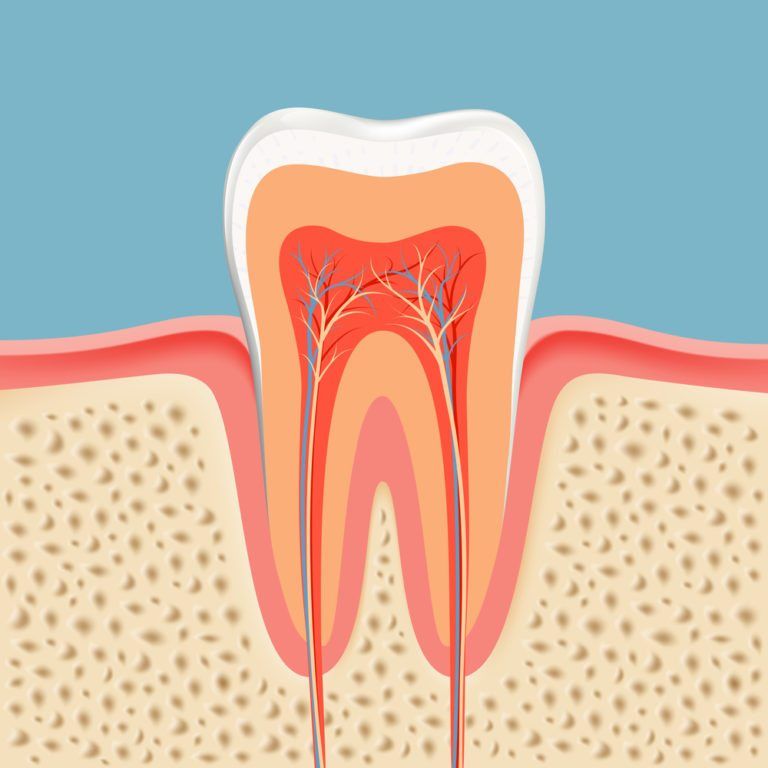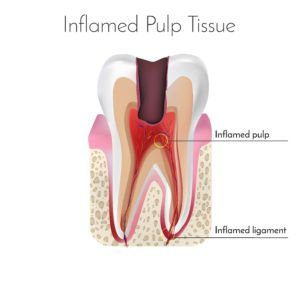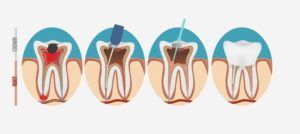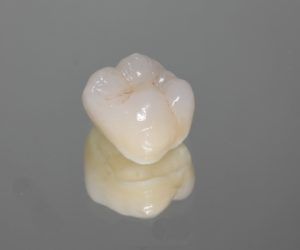Root Canals

Root canals are restorative dental procedures performed when tooth decay has permeated the innermost, or pulp, layer of the tooth. Once tooth decay reaches the pulp layer, it causes an infection in the tooth’s pulp and roots that may or may not lead to abscess in the gums. Such infections are often extremely painful and threaten the health of the affected tooth, as well as the health of the surrounding teeth and gums. Root canals are essential to remove the infected tissue and prevent the loss of the tooth.
Did You Know?
Once your tooth has been restored with root canal therapy, also known as endodontic treatment, it can last a lifetime. Although the dental restoration protecting the tooth will need to be replaced eventually, the tooth itself should remain intact if properly cared for.
Frequently Asked Questions:
Am I a candidate for a root canal?
You may be a candidate for a root canal if your tooth’s pulp is infected. Possible symptoms requiring a root canal can include:
- Tooth pain ranging from mild to severe
- Swelling or inflammation of the surrounding gum tissue
- An inability to bite or chew with the affected tooth
- Tooth sensitivity to hot and cold temperatures
- Tooth discoloration
If you have any of these symptoms, it is important to have Dr. Simpson evaluate you. Only he can accurately diagnose the need for a root canal.
What causes a pulp infection?

Dental pulp can become infected for various reasons. The most common reason is because the bacteria that cause tooth decay have eroded the outer and middle layers of the tooth. The tooth is composed of three layers and the enamel and dentin layer are intended to protect the pulp layer. However, once the bacteria has permeated the outer and middle layer, the pulp can easily become infected.
The pulp can also become infected when trauma causes the outer layers of the tooth to be cracked or chipped, allowing bacteria to enter. Another possible cause is that a dental restoration, such as a filling or crown, may have failed and allowed bacteria to enter the pulp.
Will my root canal hurt?
During your root canal, your mouth will be anesthetized so you will be numb and not feel anything. Although thought to be painful, root canals actually relieve pain from the infection. Any pain that is associated with root canals is generally caused by the infection itself rather than the procedure. This is because the pulp layer contains nerves, blood, and lymph tissues, and when it becomes infected it causes an inflammatory response in the body which results in pain and swelling.
Because root canals actually remove all the inflamed and infected tissue, there should be less pain after the procedure. However, any residual pain is usually a result of the previous inflammation and should fade quickly.
What is the root canal process?

To begin the process, x-rays will likely be taken to determine the extent of the infection. To prepare you for your procedure, your mouth will be anesthetized to keep you comfortable. Dental sedation options may also be offered if you desire. The affected tooth will then be isolated with a dental dam to prevent saliva from entering the treatment area.
Once you and your tooth have been prepared, a small access hole will be drilled in the crown of your tooth. This hole allows Dr. Simpson to access the pulp chamber and root canals. Once inside, he will use special root canal files to gently remove the tooth’s nerve and the infected pulp tissue. He will then clean the remaining pulp chamber and root canals by flushing them with water or sodium hypochlorite, an antiseptic.
After the pulp chamber and root canals have been thoroughly cleaned, Dr. Simpson will fill the remaining space with a special root canal filling material called gutta-percha. This will provide the tooth with internal support and prevent it from becoming damaged. In some cases, a small post may also be inserted into the space to provide additional support. A temporary filling will then be placed over the gutta-percha, effectively sealing up the tooth.
What happens after a root canal?

After your root canal, you will need to wait for your tooth to heal before having a permanent restoration placed. In most cases, dental crowns are the preferred restoration for root canals because the encase the tooth to protect it from damage or decay. Until your dental crown can be placed, you will need to take special care to avoid damaging or dislodging the temporary filling. This means that you will need to avoid chewing on the side the root canal was performed on.
In the days directly following your root canal, you may also experience some soreness. This is because your tooth is still recovering from the infection and it takes a few days for the inflammation to go down. In most cases, any discomfort can be managed with over the counter pain medications.
Once your permanent restoration has been placed, you will simply need to care for the affected tooth with regular brushing and flossing. Your daily oral health routine should consist of twice daily brushing and daily flossing. Additionally, you will need to visit Appletree Dentistry twice a year for your dental checkups and teeth cleanings.
What is root canal retreatment?
Root canal retreatment is a necessary procedure when a tooth that has already had a root canal becomes infected again. Infection can occur because of tooth decay, trauma, or a faulty dental restoration. Infection can also occur if there were tiny or crooked root canals that were not cleaned during the initial treatment.
What are the alternatives to a root canal?
The only alternative to a root canal is to have the affected tooth extracted. Unfortunately, once the pulp has become infected, the only way to save the tooth is to remove the infection from the tooth. Without removing the infection, the tooth itself must be removed. Root canals are the safest, least invasive, and most affordable option.
What is the cost of a root canal?
The average cost of a root canal is $500-$1,800. Incisor root canals tend to be cheaper and range from $500-$1,000, while molar root canals are more difficult and thus more expensive. A root canal on a molar generally ranges from $800-$1,800. The cost of the dental crown will also need to be taken into account and can vary depending on the materials used to fabricate the crown.
However, dental insurance plans do classify root canals as restorative treatments and should provide a certain level of coverage to offset these costs. Our office staff can work with your dental insurance company to determine your level of coverage and total root canal costs before the procedure.
For simply great dental care, schedule a consultation with your Tigard dentist, Dr. Scott T. Simpson of Appletree Dentistry today!


